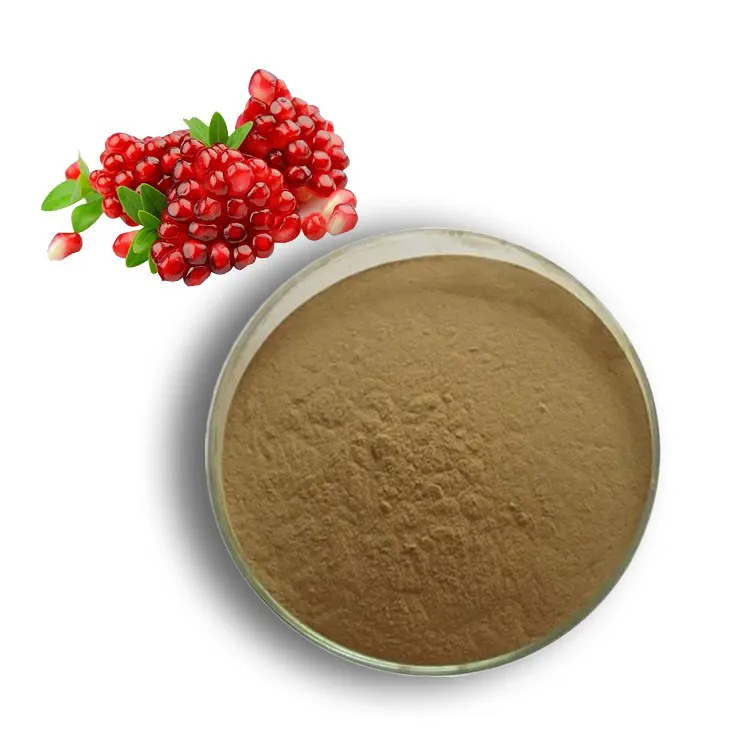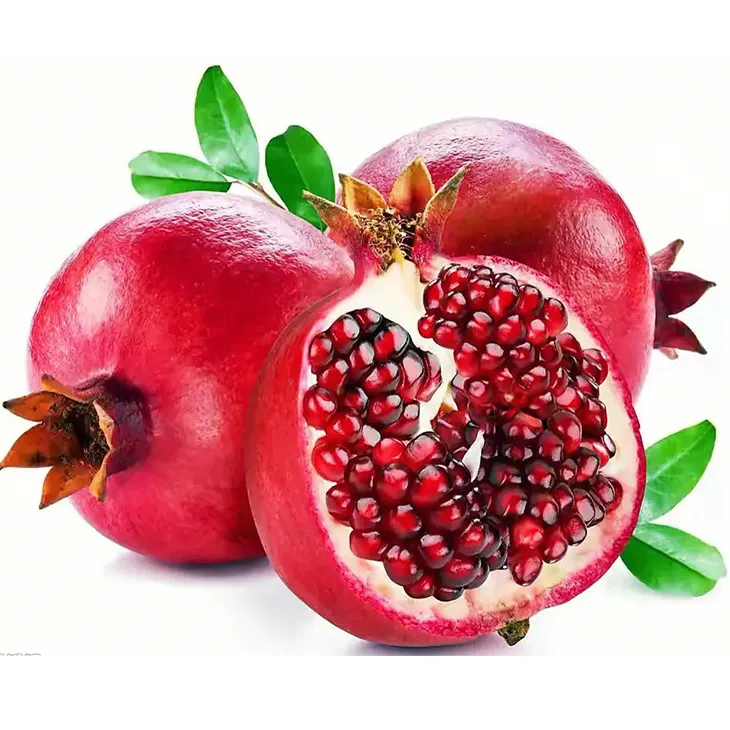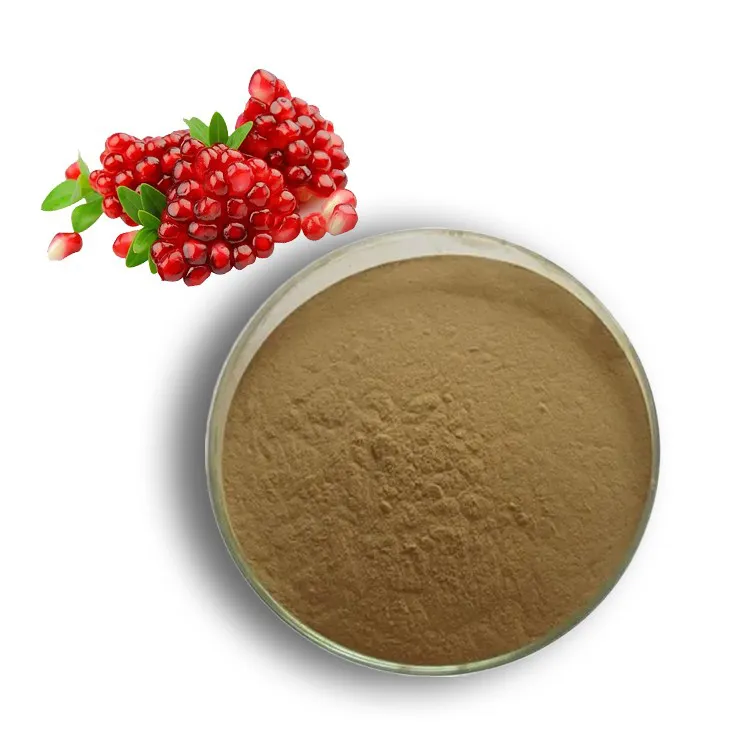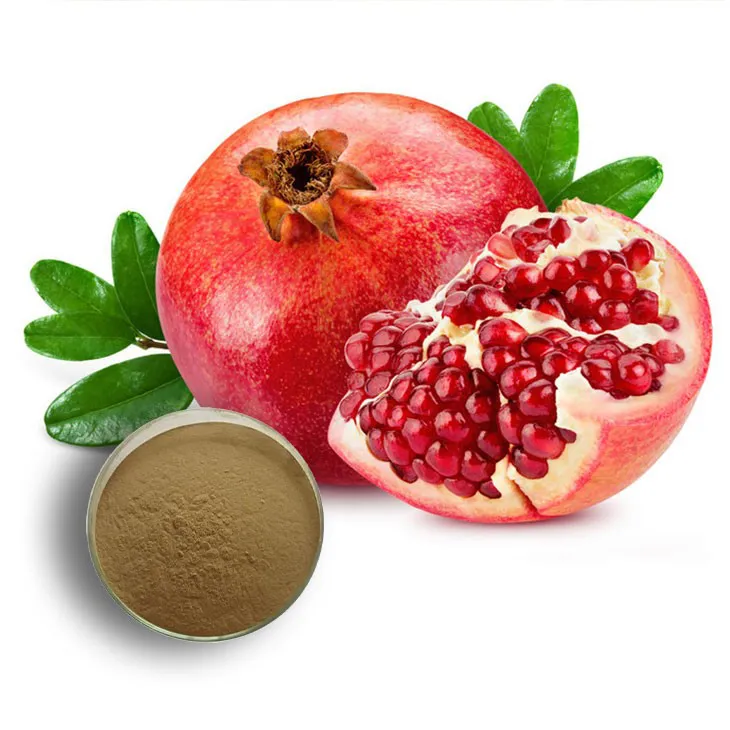- 0086-571-85302990
- sales@greenskybio.com
Active components in pomegranate extracts.
2024-11-26

Tannins in Pomegranate Extract
Pomegranate is renowned for its rich bioactive substances, and tannins are among the most notable active components. Tannins are a class of polyphenolic compounds that are widely distributed in plants, and pomegranate is no exception.
Antimicrobial Properties
Tannins possess remarkable antimicrobial properties. They can effectively inhibit the growth of certain bacteria and fungi. The mechanism behind this lies in their ability to interact with microbial cell membranes and proteins. By binding to these components, tannins disrupt the normal physiological functions of the microorganisms, thereby preventing their proliferation. For example, tannins can target common pathogenic bacteria such as Escherichia coli and Staphylococcus aureus. In laboratory studies, it has been shown that the presence of tannins in Pomegranate Extract can significantly reduce the number of viable bacteria in a culture. This makes Pomegranate Extract a potential natural alternative to synthetic antimicrobial agents in various applications, such as in the food industry to preserve food products or in the development of natural topical antimicrobial agents for skin health.

Punicic Acid in Pomegranate Extract
Another crucial active ingredient in pomegranate extract is punicic acid. Punicic acid is a type of fatty acid that is unique to pomegranates and has attracted significant attention due to its potential health benefits.
Heart - Health Benefits
Punicic acid has been strongly associated with several heart - health benefits. One of the most important aspects is its role in reducing cholesterol levels. High cholesterol is a major risk factor for heart disease, and punicic acid can help to regulate the body's cholesterol metabolism. It can increase the excretion of cholesterol from the body and also inhibit the absorption of cholesterol in the intestine. Additionally, punicic acid improves blood lipid profiles. It helps to maintain a proper balance between different types of lipids in the blood, such as triglycerides and high - density lipoproteins (HDL). A healthy blood lipid profile is essential for the proper functioning of the cardiovascular system, and punicic acid in pomegranate extract can contribute to this by reducing the levels of harmful lipids and increasing the levels of beneficial ones.

Polyphenols in Pomegranate Extract
The polyphenols in pomegranate extract are both diverse and abundant. These compounds play a vital role in the overall health - promoting properties of pomegranate.
Antioxidant Capacity
Polyphenols are well - known for their antioxidant properties. In the body, they can scavenge free radicals, which are highly reactive molecules that can cause damage to cells and tissues. Free radicals are generated as a normal by - product of metabolism, but environmental factors such as pollution, radiation, and smoking can also increase their production. If left unchecked, free radicals can lead to oxidative stress, which is associated with a variety of diseases, including cancer, heart disease, and neurodegenerative disorders. The polyphenols in pomegranate extract act as powerful antioxidants, neutralizing free radicals and preventing them from causing harm. For instance, some of the polyphenols in pomegranate extract, such as ellagic acid and anthocyanins, have been shown to have a high antioxidant capacity compared to other common antioxidants like vitamin C and E.
Immune System Support
Besides their antioxidant effects, the polyphenols in pomegranate extract also have positive impacts on the immune system. The immune system is responsible for defending the body against diseases, and polyphenols can enhance its function in several ways. They can stimulate the production of immune cells, such as lymphocytes and macrophages, which are key players in the immune response. These immune cells are responsible for recognizing and eliminating foreign invaders, such as viruses and bacteria. Additionally, polyphenols can modulate the immune response, preventing it from overreacting or underreacting. This balance is crucial for maintaining good health, as an overactive immune system can lead to autoimmune diseases, while an underactive one can make the body more susceptible to infections. By supporting the immune system, the polyphenols in pomegranate extract can help the body to better defend against diseases and maintain overall well - being.

Other Active Components in Pomegranate Extract
Aside from tannins, punicic acid, and polyphenols, pomegranate extract contains other active components that also contribute to its health - promoting properties.
Flavonoids
Flavonoids are a group of polyphenolic compounds that are present in pomegranate extract. They have various biological activities, including anti - inflammatory and antioxidant effects. Flavonoids can reduce inflammation in the body by inhibiting the production of inflammatory mediators, such as cytokines and prostaglandins. Inflammation is a key factor in many chronic diseases, such as arthritis, diabetes, and cardiovascular disease. By reducing inflammation, flavonoids in pomegranate extract can help to prevent or manage these diseases. Moreover, flavonoids also contribute to the antioxidant capacity of pomegranate extract, working in tandem with other polyphenols to scavenge free radicals and protect cells from oxidative damage.
Minerals and Vitamins
Pomegranate extract also contains essential minerals and vitamins. Minerals such as potassium, magnesium, and calcium are important for maintaining proper physiological functions in the body. Potassium is involved in regulating blood pressure, magnesium is essential for muscle and nerve function, and calcium is crucial for bone health. Vitamins present in pomegranate extract, such as vitamin C and vitamin K, also play important roles. Vitamin C is an antioxidant that can enhance the immune system and promote collagen synthesis, while vitamin K is necessary for blood clotting. These minerals and vitamins, although present in relatively small amounts in pomegranate extract, still contribute to its overall nutritional value.

Applications of Pomegranate Extract and Its Active Components
The active components in pomegranate extract have led to a wide range of applications in various fields.
Food and Beverage Industry
In the food and beverage industry, pomegranate extract is used as a natural flavor enhancer and preservative. The antimicrobial properties of tannins can help to extend the shelf life of food products, reducing the need for synthetic preservatives. Pomegranate extract is also added to juices, wines, and other beverages to impart its unique flavor and to provide potential health benefits to consumers. For example, the addition of pomegranate extract to a fruit juice can increase its antioxidant content, making it a more "healthy" option for consumers. Moreover, the heart - health benefits of punicic acid and the immune - boosting effects of polyphenols can be promoted as added value for pomegranate - based food and beverage products.
Pharmaceutical and Nutraceutical Industries
The pharmaceutical and nutraceutical industries are also interested in the active components of pomegranate extract. Punicic acid's potential in reducing cholesterol levels has led to research on its use in the development of drugs for heart disease prevention. Polyphenols, with their antioxidant and immune - modulating properties, are being studied for their potential in treating various diseases, such as cancer and neurodegenerative disorders. Tannins' antimicrobial properties may also be exploited in the development of new antibiotics or topical antimicrobial agents. Additionally, pomegranate extract in the form of dietary supplements is becoming increasingly popular, as consumers are becoming more aware of the potential health benefits of natural products. These supplements can provide a concentrated dose of the active components, allowing consumers to easily incorporate the health - promoting properties of pomegranate into their daily routine.
Cosmetic Industry
In the cosmetic industry, pomegranate extract is used for its antioxidant and anti - inflammatory properties. The polyphenols and flavonoids in pomegranate extract can protect the skin from oxidative damage caused by environmental factors, such as UV radiation and pollution. This can help to prevent premature aging of the skin, including the formation of wrinkles and fine lines. The anti - inflammatory properties of pomegranate extract can also be beneficial for treating skin conditions such as acne and eczema. Pomegranate extract is often incorporated into skincare products, such as creams, lotions, and serums, to provide these skin - health benefits.
Research and Future Perspectives
Despite the many known benefits of the active components in pomegranate extract, there is still much research to be done.
Mechanisms of Action
Although some of the mechanisms of action of the active components, such as the antioxidant and antimicrobial mechanisms, have been partially understood, there are still many aspects that need further clarification. For example, the exact way in which punicic acid reduces cholesterol levels at the molecular level is not fully known. Understanding these mechanisms in more detail will allow for more targeted and effective use of pomegranate extract and its active components in the treatment and prevention of diseases.
Clinical Trials
More clinical trials are needed to confirm the efficacy of pomegranate extract in treating various diseases. While there have been some promising pre - clinical studies, human trials are essential to establish the safety and effectiveness of pomegranate extract in a real - world setting. These trials should be well - designed, with appropriate control groups and long - term follow - up to accurately assess the impact of pomegranate extract on different health conditions. For example, in the case of using pomegranate extract for cancer prevention, large - scale clinical trials are required to determine whether it can truly reduce the risk of cancer development in humans.
New Applications
As research progresses, new applications for the active components in pomegranate extract may be discovered. For instance, with the growing understanding of the immune - modulating properties of polyphenols, there may be potential for their use in the development of vaccines or immunotherapy. Additionally, the unique combination of active components in pomegranate extract may hold promise for the treatment of complex diseases that involve multiple pathophysiological mechanisms, such as metabolic syndrome. Continued research into pomegranate extract and its active components will likely uncover more of its potential and lead to the development of novel products and therapies in the future.
FAQ:
What are the main active components in pomegranate extracts?
The main active components in pomegranate extracts include tannins, punicic acid and polyphenols.
How do tannins in pomegranate extracts function?
Tannins in pomegranate extracts possess antimicrobial properties, which can inhibit the growth of certain bacteria and fungi.
What are the benefits of punicic acid in pomegranate extracts for heart health?
Punicic acid in pomegranate extracts has been associated with heart - health benefits, such as reducing cholesterol levels and improving blood lipid profiles.
What role do polyphenols in pomegranate extracts play?
Polyphenols in pomegranate extracts are diverse and abundant. They not only enhance the antioxidant capacity but also have positive impacts on the immune system, helping the body to defend against diseases more effectively.
Are there other potential benefits of pomegranate extract?
Besides the mentioned benefits, pomegranate extract may have other potential benefits as well, which may be related to its various active components and their interactions. However, more research is needed to fully explore these potential benefits.
Related literature
- Pomegranate Extract: A Review of Potential Health Benefits"
- "Bioactive Compounds in Pomegranate and Their Therapeutic Properties"
- "The Role of Pomegranate Extract in Cardiovascular Health"
- ▶ Hesperidin
- ▶ citrus bioflavonoids
- ▶ plant extract
- ▶ lycopene
- ▶ Diosmin
- ▶ Grape seed extract
- ▶ Sea buckthorn Juice Powder
- ▶ Beetroot powder
- ▶ Hops Extract
- ▶ Artichoke Extract
- ▶ Reishi mushroom extract
- ▶ Astaxanthin
- ▶ Green Tea Extract
- ▶ Curcumin Extract
- ▶ Horse Chestnut Extract
- ▶ Other Problems
- ▶ Boswellia Serrata Extract
- ▶ Resveratrol Extract
- ▶ Marigold Extract
- ▶ Grape Leaf Extract
- ▶ blog3
- ▶ blog4
-
Organic Tongkat Ali extract powder factory.
2024-11-26
-
How to make powder with ashwagandha extract.
2024-11-26
-
Rosehip extract manufacturers from China.
2024-11-26
-
The best cat's claw extract in nature.
2024-11-26
-
Chinese Dandelion Leaf Extract Suppliers.
2024-11-26
-
Oat Straw Extract Powder
2024-11-26
-
Lavender Extract
2024-11-26
-
Passionflower Extract
2024-11-26
-
Tormentil Extract
2024-11-26
-
Natural grape seed extract
2024-11-26
-
Panax Ginseng Leaf Extract
2024-11-26
-
Saponin Extract
2024-11-26
-
Acerola Juice Powder
2024-11-26
-
Chasteberry Extract
2024-11-26
-
Oyster Mushroom Extract Powder
2024-11-26





















